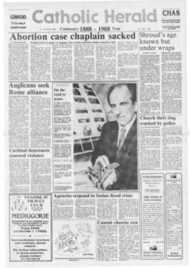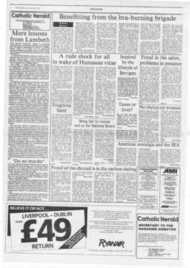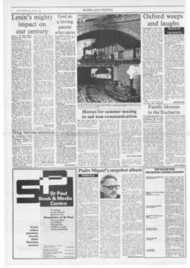Page 6, 12th August 1988
Page 6

Report an error
Noticed an error on this page?If you've noticed an error in this article please click here to report it.
Tags
Share
Related articles
Jesuit Appointed
Unlikely Biker In El Salvador
The Catholic Herald
Disciples Must Be Obedient In Faith
Murder Of Six Priests Followed By Threats To Other...
Padre Miguel's snapshot album
PROFILE
ON the eve of his appointment as English Superior of the Jesuits Fr Michael CampbellJohnston SJ received a letter from the outgoing Superior Fr George Earle telling the San Salvador-based priest of the Society's plans for him. Fr Michael, the letter said is "top of the terna (list of three names submitted) for the Provincial because they thought you were uniquely qualified to lead the Province in the direction of the promotion of justice and the option for the poor."
And so a somewhat reluctant Fr Michael was plucked out of the "family" of Salvadoran refugees he had grown to love and placed in the pristine and civilised offices of the Jesuit London headquarters at Mount Street.
"Am I happy doing my job? Well there are different levels of happiness. At a formal level I am happy to be doing what I was asked to do; that's Jesuit obedience for you. But at the human level I miss very much the work I was doing in El Salvador", Fr Michael told me. "I feel that I have left just when the political situation is deteriorating as it did in the early 80s when there was a lot of open violence on the streets and corpses were appearing on the road every morning."
To illustrate his sadness at leaving El Salvador Fr Michael became for the moment the proud father who uses the slightest excuse to boast about his children and who regails the listener with photos of them. Into my lap was plonked a voluminous photo album containing pictures of Fr Michael among flocks of scruffy, yet smiling refugees who had
been forced to leave their homes because of army bombing of their villages, and who are now being resettled and cared for by the likes of "Padre Miguel", as they liked to call him. With a history of working with and for the poor in all parts of the globe Fr Michael is no stranger to suffering. His conversation with me revealed, however, that as well as having a dehumanising effect, suffering and oppression can uplift human beings and transform them into vessels of God's love. He told me for instance of an eight-year-old boy whose family had all been shot by the military. Found under the bleeding corpses of his grandmother, mother, two older sisters and younger brother, the boy went into an orphanage. "I heard his confession," said Fr Michael. "It was a confession like any other child's, but at the end he said 'Padre Miguel, pray for me that I do not hate the soldiers that killed my family'". "There is no need for me to tell the suffering that God loves them for they always tell you that themselves by their actions and words. It is leaving people like that little boy that hurts." Fr Michael worked with internal refugees in a barrio on the outskirts of San Salvador. Called El Despertar, (the awakening) his headquarters became the home for a perpetual extended family made up of those who had had to move from their homes. It had also been a catechetical centre for a previous priest who had been brutally shot, and then run over by a tank belonging to the military.
He brings with him to England an approach to Christianity stripped of its comforting niceties and filled with the unwavering pragmatism of one who has had to rely on people who know God as a friend, not as a hobby.
Fr Michael has admitted on numerous occasions that he doesn't know where to begin with the English Province, but he is convinced that the seeds of the social gospel are there. He told me for instance of the Jesuit Volunteer Corps, a group of community-based Christians who work in areas most marked by violence and poverty such as Toxteth in Liverpool.
"There are little groups of Christians dotted all around who are concerned with justice issues abroad as well as at home. Although they are on the fringe now, their time will come", he said.
For the moment Fr Michael is determined not to turn down any chances to talk about the poor. He has been on TV and has been interviewed by many major publications. "It has been the practice with the Jesuits to pick someone who has been in the 'missions' as they used to be called, and to plonk them as Provincial in a comfortable Province — to shake them up a bit. How I'm going to shake the Province up is another question altogether", he said.
Martin Newland
blog comments powered by Disqus











